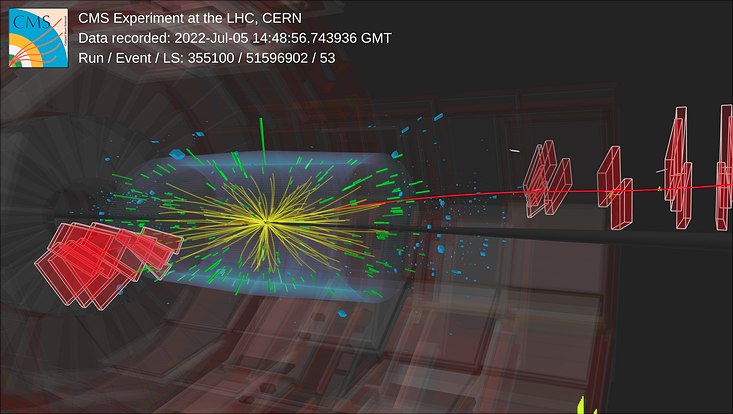Round and round it goes!Restart of the Large Hadron Collider with record energy
13 July 2022

Photo: CERN/CMS Collaboration
After a three-year shut-down phase, protons have been colliding again in the Large Hadron Collider (LHC) at the European Center for Particle Physics CERN near Geneva since July 5 - this time with a new record energy. Researchers from the Cluster of Excellence Quantum Universe and the Institute of Experimental Physics at Universität Hamburg are looking forward to the new data from the CMS and ATLAS detectors at the LHC.
Particle physicists from the Cluster of Excellence Quantum Universe and the Institute of Experimental Physics observed the restart of the LHC particle accelerator with great interest last week. After a three-year shut-down, during which components of the accelerator and the four large detectors were renewed and optimized, data from proton collisions at CERN are being recorded again by the experiments. The particles at LHC collide with a record energy of 13.6 TeV, the largest energy ever produced by man.
Just one day after the tenth anniversary of the discovery of the Higgs particle on July 4, which was also celebrated in Hamburg with a public event, the new run of the LHC particle accelerator opens up the possibility of investigating the properties of the Higgs particle in detail and thus answering open questions about the origin, development and composition of the universe. Researchers will also use the new data to advance the search for effects of so-called 'new physics', such as dark matter.
Since the restart of the particle accelerator, everything has been going according to plan. The CMS and ATLAS detectors, in which Hamburg researchers are heavily involved, are recording data from the first collisions. By the time the new run will be completed at the end of 2025, gigantic amounts of data will have been generated, which the researchers will start to evaluate in the coming months and years to clarify fundamental questions about our universe.


